Foreign workers are openly traded in a lucrative scheme, where traffickers earn perpetual commissions from the sweat and toil of those who come to Malaysia in search of employment.
Malaysiakini’s investigation found that multiple levels of traffickers not only charge prospective employers a sizable one-off fee for procuring the workers, but they also take commissions out of the workers’ hourly wages, leaving them with a paltry sum at the end of the month.
The scheme also sees workers trapped by the traffickers, who collect their salaries on their behalf, and hang on to their passports.
Posing as prospective employers, Malaysiakini was offered workers for a one-off payment of RM1,700 per head, not including management and documentation fees.
The final cost, including management fees, medical checks, levy payment, insurance and visa would be RM2,800 per person per month, the quotation read.
From this, RM1,500 is supposed to be the salary for the workers, while the remaining RM1,300 per month is taken by the traffickers.
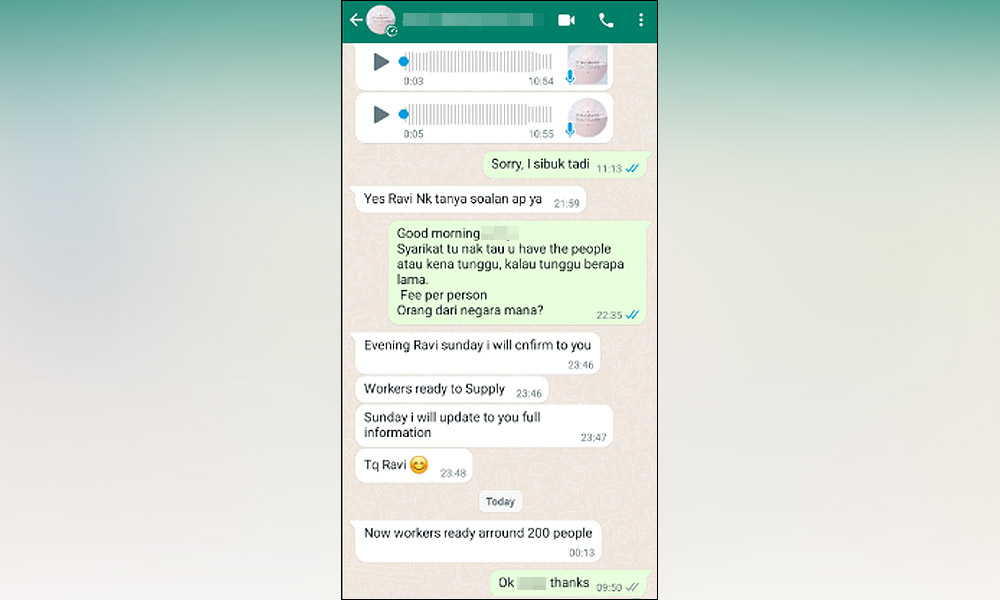
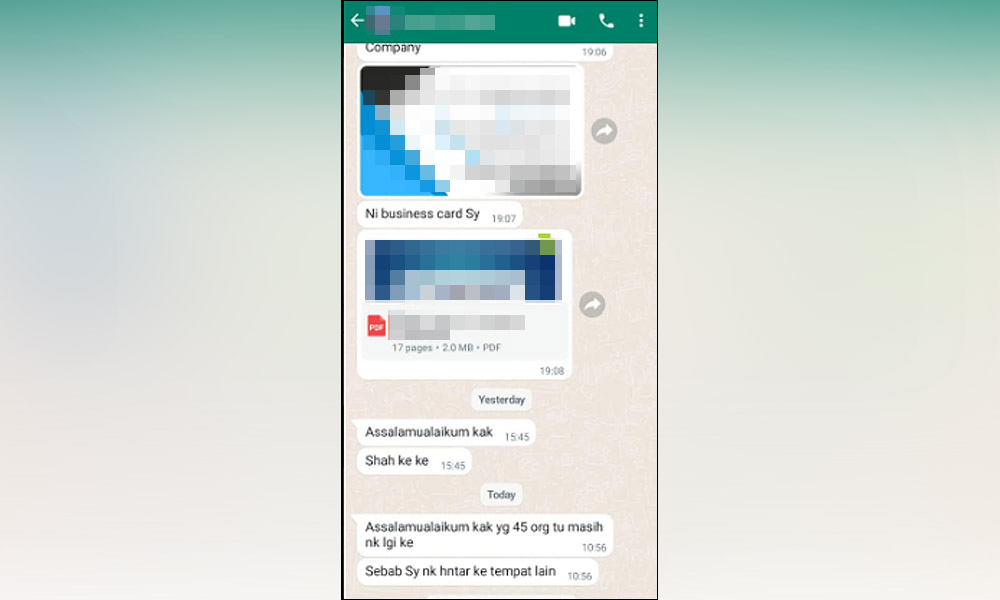
“We have 200 workers who are already in Malaysia and ready to work. All Bangladeshis,” the trafficker, a Malaysian national, offered.
The Selangor-based trafficker’s quotation was for a “standard non-negotiable package” to provide 45 cleaners, working 12 hours a day for 26 days a month, excluding overtime.
In another case, a trafficker in Johor Bahru cold-called an employer offering two workers for just RM5,000.
Largely known simply as labour agents, the unlicensed touts are referred to as traffickers in this article because they are engaged in trafficking in persons, according to the law.
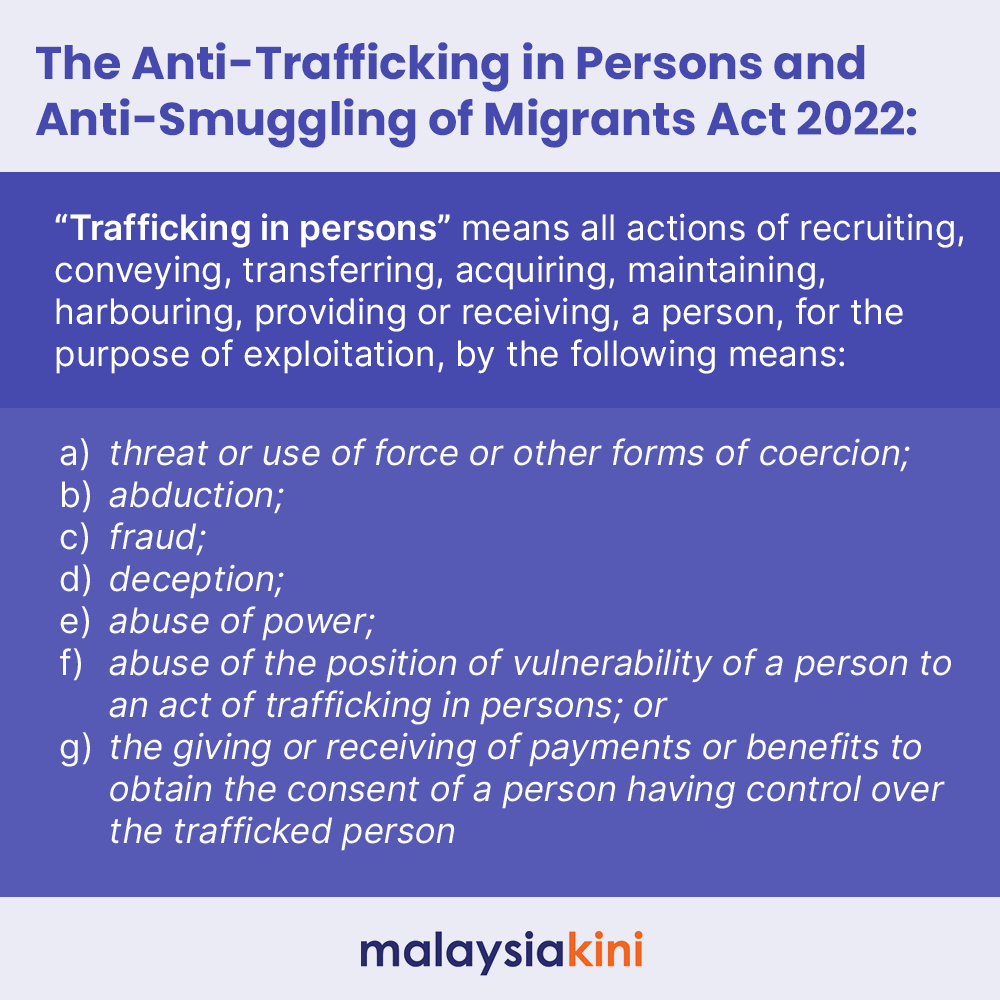
Cold-calling potential employers
The practice is widespread and conducted with impunity, as the touts openly cold-call prospective employers, who are often desperate to fill labour shortages, Malaysiakini found.
Despite the shady nature of their business, traffickers demand company registration details of prospective employers to conduct “background checks” before a quotation is issued.
They also use tactics to rush employers into agreeing to the deal, by stating that the workers are “now ready” or “sudah sampai” (already arrived), indicating that the employers can skip the tedious foreign worker application process involving the Human Resources Ministry and Home Ministry.
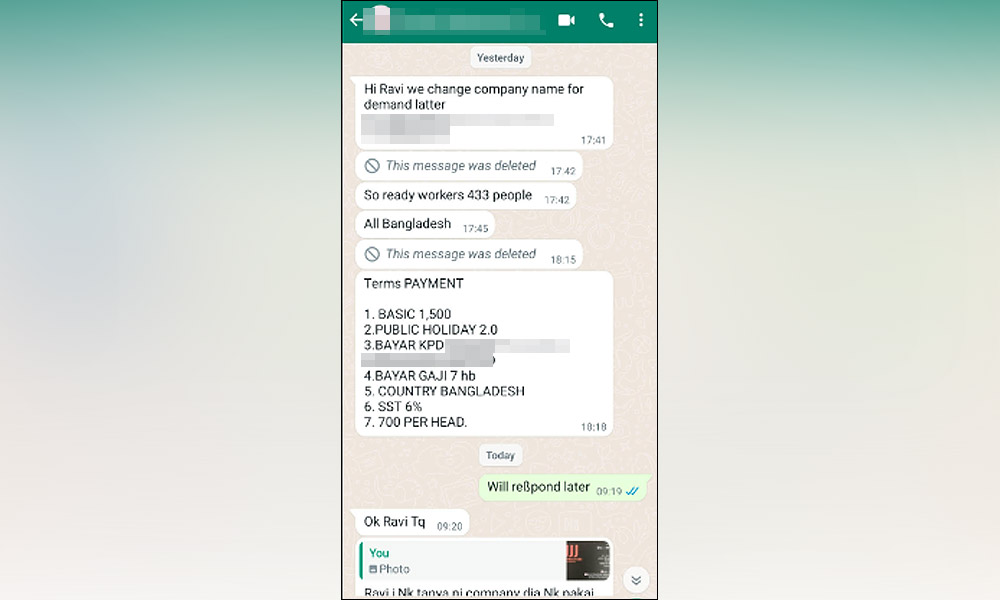
They avoid providing many details in black and white, manoeuvring instead to meet in person, where more details will be revealed.
Conversations with a trafficker
In one case, Malaysiakini managed to obtain a quotation via WhatsApp after several weeks of communication, but it was provided on a document without a letterhead (below).
When asked, the trafficker said he would provide a quotation with a company’s letterhead, after meeting in person and finalising the deal. Malaysiakini did not complete the deal.
He also provided the names of two companies, through which the workers will be supplied.
However, checks on the various addresses of the companies, provided by the trafficker, found either nondescript and unoccupied office units or in one instance, a massage parlour.
One of the companies named by the trafficker did not exist in the Companies Commission of Malaysia’s (CCM) registry, while another openly advertised itself as a manpower agency but is registered as a maintenance and textile trading firm.
Though unlicensed as a labour supplier, the latter’s glossy brochure states that it “outsources workers to hotels” in Genting Highlands, Klang Valley and Johor Bahru, and has “supplied and trained more than 2,000 workers for various sectors”.
The company, which has a RM1 million paid-up capital, is 70-percent owned by one “Datuk” and two foreigners who own 30 percent.
The “Datuk” told an undercover Malaysiakini journalist that the workers are legitimately imported through another licensed labour agency, which he owns. He also disputed some elements of the quotation provided by the trafficker.
Checks found this so-called licensed labour agency is not on the list of agencies licensed by the Human Resource Ministry to supply foreign workers.
Desperate employers willing to fork out
The trafficker’s offer of RM2,800 per month per worker is exorbitant, compared to hiring through licensed labour agencies.
Instead of monthly charges, licensed agencies charge a one-off fee of RM2,360 for documentation, medical checks and other requirements and an additional RM1,500 service fee for managing the recruitment process.
The service fee is only RM1,500 because legally, they can charge no more than the worker’s monthly salary for their one-off services.
As such, the total one-off payment charged by licensed labour agencies is RM3,860 per worker, whose visa is typically valid for a year.
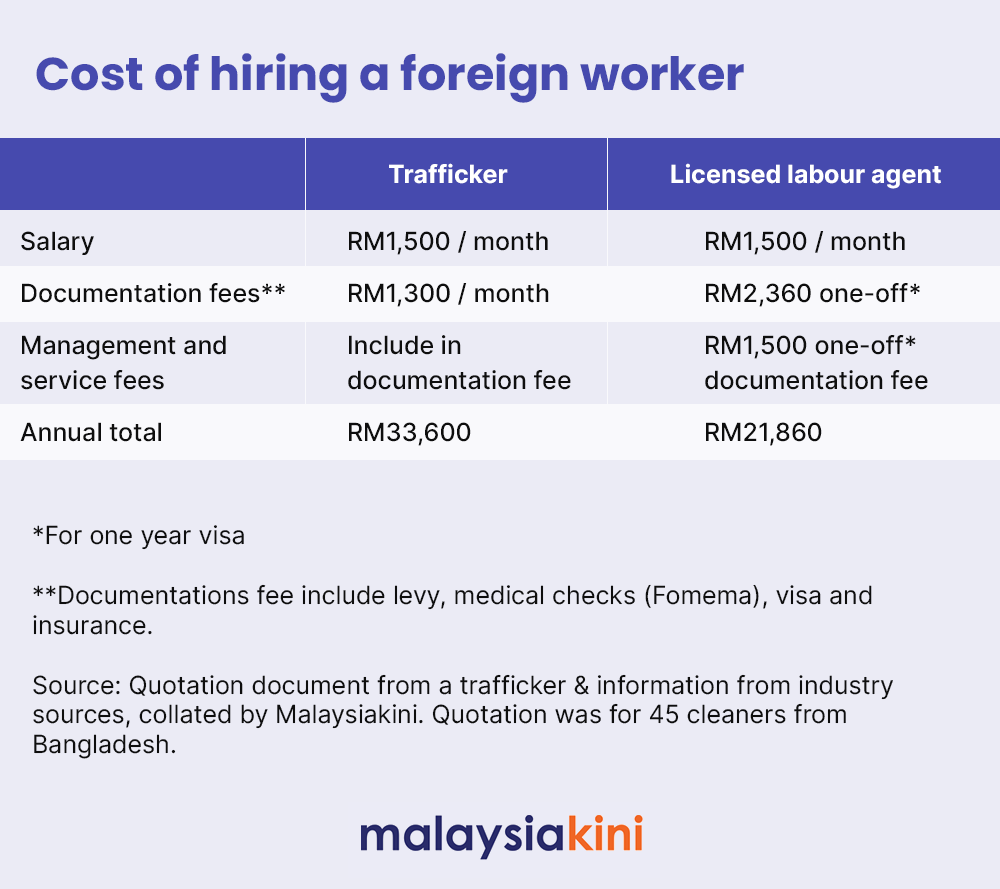
In comparison, going by the trafficker’s quotation, an employer ends up paying RM15,600 per worker a year, just in agent fees. This works out to about half a million ringgit, for the recruitment of 45 workers, as per the quotation.
Even so, employers are willing to pay this sizable amount to traffickers, to bypass the bureaucracy and endure long waits for foreign workers, industry sources say.
Enjoying commissions from each worker’s hourly wage
For workers, the price of employment is becoming bonded labour.
“You use them, but they are my workers. I hold their passports. You provide the accommodation and transportation to the workplace,” said the trafficker, whom Malaysiakini is not identifying for legal reasons.
He added if the employer is unable to provide accommodation and transportation, the agent can do so for an extra charge.
Sources in the industry told Malaysiakini that even those introducing prospective employers to an agent will get a cut of a worker’s monthly salary if the deal goes through.
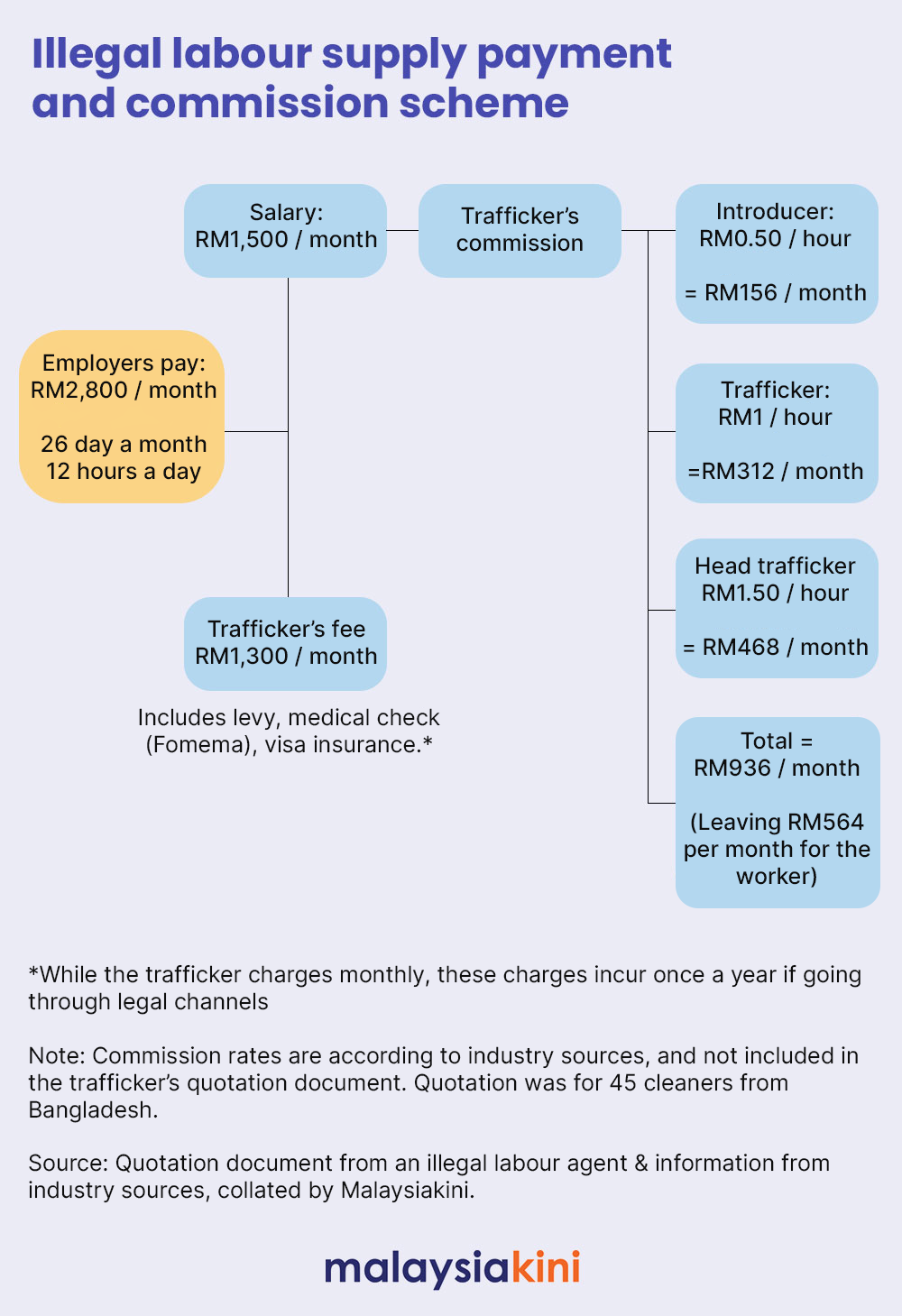
Typically, there are three tiers to the scheme - the introducer, the trafficker and the head trafficker, sources say.
The introducer, at the bottom-most tier of the pyramid, typically gets to skim 50 sen for every hour that the worker is paid for.
The trafficker, one the middle tier, gets RM1 for an hourly wage while the head agent, at the top of the pyramid, takes RM1.50 from a worker’s hourly wage.
Assuming a 12-hour work day, and 26 working days a month, the introducer and two traffickers share between them a sum of RM936 from each foreign worker’s monthly wage of RM1,500.
For 45 workers, as per the quote obtained by Malaysiakini, this would work out to be a commission of RM14,040 a month for the middle-tier agent and RM21,060 a month for the head agent.
Victimised at home and abroad
Commissions on their salary are not the only way workers are losing out.
Advocates for migrant worker rights say workers also fall prey to the well-laid plans of illegal agencies that collaborate with their foreign counterparts.
These agencies lure workers with promises of earning substantial income that could elevate them and their families from poverty for generations to come.

Migrant rights organisation, North-South Initiative’s executive director Adrian Pereira said workers pay as much as RM20,000 per person, upfront, to agents who promise to find them jobs in Malaysia.
While some of this pays for their travel costs, most are divided among many layers of recruitment agents.
“Some are locals and some are foreigners, that is the reality. The debt bondage of foreign workers would lead them into forced labour by merciless employers,” he said.
Malaysiakini has contacted the Immigration Department and Human Resources Ministry for comments. - Mkini




No comments:
Post a Comment
Note: Only a member of this blog may post a comment.